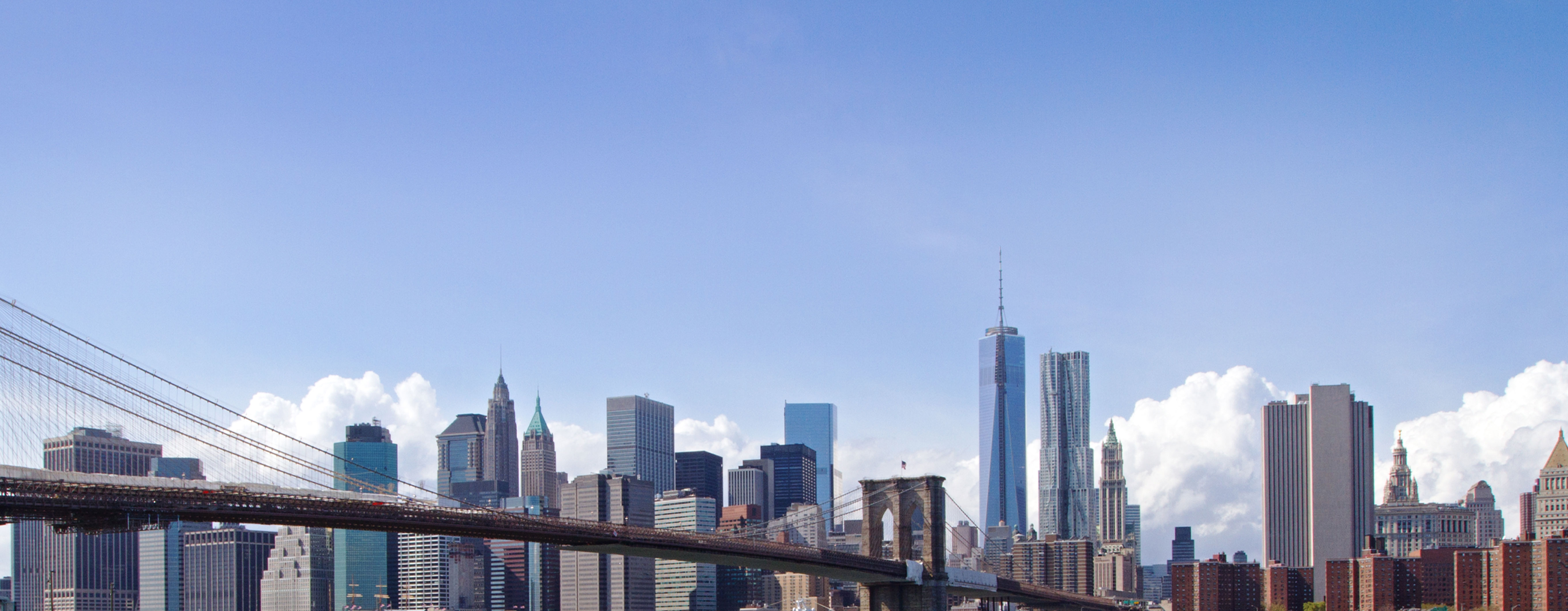
Home Insurance in New York City
Living near Coney Island Beach or Central Park in New York City means amazing, pristine views and endless things to do. But have you thought about how to protect your home and everything inside it against the unknown?
That's where homeowners insurance comes in. With the right coverage, your home could be protected from the unexpected.
How much is the average homeowners insurance in New York City?
The average annual cost of home insurance in New York is $2,295.
However, if you're wondering how rates have changed in the last five years, the table below shows the average costs over time across the state.
Keep in mind, these are statewide figures. Your rate might vary based on where you live. Factors like home value, local weather, and population could affect your premium.
Year | Average Annual Premium* |
|---|---|
2025 | $2,295 |
2024 | $1,164 |
2023 | $1,511 |
2022 | $1,226 |
2021 | $1,455 |
What factors influence my home insurance rate?
Many factors could affect how much you pay for homeowners insurance in NYC. Whether you own a brownstone in Brooklyn or a property in Manhattan, insurance companies consider a range of details to calculate your premium.
Here's a breakdown of what typically impacts your rate:
- Location: Where your home is located is one of the biggest influences on your insurance cost. If you live in an area that's prone to natural disasters like floods or hurricanes, or one with a higher crime rate, you could expect to pay more for coverage in New York City.
- Home value: Your home's value matters because it determines how much it would cost to rebuild if it's completely damaged. In New York City, where property values are high, this could make a significant difference. Insurance providers often check the home's purchase price and appraisal to set coverage limits.
- Home features: Certain features make your house riskier to insure. For example, if you have a swimming pool or trampoline, your premium will likely be higher due to the increased risk of injury. Outdated electrical, plumbing, or heating systems could also raise your rate because they're more likely to cause damage.
- Claims history: A clean claims history could save you money. Insurers reward customers who haven't filed many claims, often with discounts. On the flip side, having multiple past claims could lead to higher rates. Many home insurance companies in NYC use a CLUE report to check your home and auto claims from the last seven years.
- Coverage amount: The coverage amount you choose could also affect your premium. If you want a higher coverage limit to fully protect your home and belongings, you'll pay more. However, this additional cost gives you peace of mind that you're better protected in case of a total loss.
Whether you shop for home or condo insurance in NYC, make sure to understand these factors, as they could help you find the right insurance coverage policy at the best rate.
Common insurance discounts in New York City
NYC home or condo insurance could be expensive. If you’d like to decrease your homeowners’ insurance premium, there are a few things that you could do without cutting coverage.
Many insurance companies often offer discounts that could make your policy more affordable. From bundling policies to making eco-friendly upgrades, here are some common discounts you might qualify for:
- Multi-policy discount: If your insurance company provides more than just homeowners insurance, like auto or renters insurance, you could save by bundling. Buying multiple policies from the same company usually earns you a multi-policy discount.
- Loyalty discount: Some insurance carriers reward homeowners who stay with them for a long period of time. The longer you stick with them, the more you might save. However, note that loyalty doesn't always mean the best deal. It's better to compare NYC homeowners insurance costs every year to make sure you’re still getting the best price.
- Advance quote discount: Often, homeowners in New York City could get a discount if they plan ahead. Many insurance companies will reduce your premium if you request home insurance quotes in NYC one or two weeks before you need the policy to start. This is known as an advance quote discount, and it's an easy way to save.
- New home discount: If your home was built recently, you might qualify for a new home discount. Newer homes are usually built to modern safety codes, which makes them less likely to have costly damage. Most insurers consider a home "new" if it's less than 10 years old.
- Green home discount: Eco-friendly houses could also qualify for savings. If your home or property has Energy Star-rated appliances, is LEED-certified, or includes other sustainable features, you might earn a green home discount. These upgrades not only help the planet, but they could also reduce your insurance premiums.
What does home insurance in New York City typically cover?
A standard homeowners insurance in NYC – also called an HO-3 policy – provides a broad range of protection for your home and personal belongings. It typically covers damage to your home's structure, your personal items, and more.
While NYC property insurance is not required by law, mortgage lenders typically require it to protect the home. Here's what home insurance in NYC usually covers:
- Dwelling coverage: Dwelling coverage is the core of your home insurance policy. It pays to repair, rebuild, or replace your home if it's damaged by a covered loss. This might include things like fire, vandalism, theft, or severe weather (such as wind, hail, or lightning). It could also cover damage caused by outside forces, such as a falling tree branch.
- Personal property coverage: This policy covers personal belongings inside your home. It includes furniture, clothing, appliances, and your heating or cooling systems. If you own expensive items such as jewelry, fine art, or collectibles, you might need to purchase extra coverage to fully protect them.
- Other structures: Detached structures on your property – like a garage, shed, barn, outdoor fireplace, fence, swing set, or wall – are also covered. Recreational items, such as trampolines or swimming pools, might also be included. However, because they pose a higher risk, you might need additional liability coverage.
- Loss of use: If your home becomes unlivable due to a covered event, loss of use coverage could help pay for temporary living expenses. This could include hotel stays, restaurant meals, or parking fees. Keep in mind that policies have set limits and timeframes, so check your policy details to know what's covered.
- Personal liability coverage: Liability coverage helps protect you financially if someone is injured on your property and decides to sue. It could help pay for legal costs, settlements, and medical expenses.
- Medical payments: Medical payments coverage applies if someone, other than a household member, is accidentally hurt on your property. It covers reasonable treatment costs and copays, usually within a year of the accident. This coverage comes standard, but you could increase the limits if needed.
Additional New York City insurance coverage options
Optional home insurance coverage, also called an endorsement, is extra protection you could add to your standard policy. Endorsements could help increase your coverage limits, cover items not included in your base policy, or protect you from specific risks.
Listed below are a few additional insurance coverage options available in New York City:
- Scheduled personal property: This insurance rider or endorsement is for high-value items like jewelry, watches, computers, or collectibles that go beyond the coverage limits of your standard policy. To get this added protection, you'll usually need to provide receipts or appraisals.
- Sewer or water backup: This add-on coverage protects you if sewage or water backs up into your home or if your sump pump overflows. It helps cover the cost of cleaning up and repairing damage, including repairs to the sewer line within your property boundaries.
- Earthquake coverage: While NYC doesn't sit on significant fault lines, earthquakes could still affect your area. So, if you live in an earthquake-prone area, consider this coverage. It helps pay for structural damage, damage to personal belongings, rebuilding costs, and temporary living expenses if your home becomes unsafe. Some insurers offer earthquake coverage as an add-on, while others might offer it as a separate policy.
- Windstorm coverage: This insurance coverage helps if your home is damaged by a hurricane, tornado, or strong windstorm. It typically covers structural repairs, loss of belongings, rebuilding costs, and temporary living expenses. Like earthquake insurance, it might be offered as an add-on or a separate policy.
- Flood insurance: New York City is highly vulnerable to flooding and faces both coastal and rainfall flooding risks. However, flood damage isn't covered under standard home insurance in NYC. You could buy flood insurance through the National Flood Insurance Program (NFIP) or from private insurers. In some cases, it might be offered as an optional add-on to your house insurance policy.
What New York City residents need to know
Living in New York City comes with unique challenges that homeowners should know when it comes to insurance. Due to its dense population, high property values, and increased risk of natural disasters like hurricanes or flooding, NYC homeowners may face higher premiums than in other areas.
It's essential to understand local building codes, the importance of flood insurance – even outside FEMA-designated zones – and the risk of theft or vandalism in certain neighborhoods.
Make sure to stay informed about these factors and regularly review your policy. This helps ensure you have the right coverage to protect your home and belongings in this dynamic urban environment.
How to lower your New York City home insurance premium
Looking to save on your home insurance rates? Here are some practical tips to help you cut your NYC home insurance cost:
- Adjust your deductible: One simple way to possibly lower your premium is to raise your deductible. This means you would pay more out of pocket if you file a claim, but your monthly premium could be reduced. Just make sure you could afford the higher deductible if something happens.
- Boost your home security: Insurance companies reward homes with strong security features. Make sure to go beyond the basics like deadbolts and smoke detectors. You could earn bigger discounts if you add a professionally monitored security system, fire sprinklers, and reinforced doors and windows.
- Maintain a good credit score: In most states, including New York, insurers use your credit history to help set your premium. Pay bills on time, reduce debt, and check your credit report regularly to keep your score in good shape.
Ask about extra discounts: Every insurance company is different, so don't be shy – ask what discounts are available. You might save more if you pay your annual premium in full, install energy-efficient appliances, or bundle your home and auto insurance. Remember, a little effort could lead to big savings over time.
Still have questions?
How much is the property tax in NYC?
Property tax in NYC varies depending on the property's assessed value and classification. On average, residential properties in NYC have an effective tax rate of around 1.64%, which is nearly double the national average.
Do you pay property taxes monthly in NYC?
Yes, you might have to pay property taxes monthly in NYC if you're enrolled in the NYCePay program. Otherwise, most homeowners pay property taxes on a quarterly or semi-annual basis. Mortgage lenders might also collect property taxes monthly and pay them on your behalf through an escrow account.
What salary do you need to live comfortably in NYC?
To live comfortably in New York City, a single person needs a salary of $138,570 per year. This accounts for housing, food, transportation, healthcare, and insurance costs. Families might need significantly more, depending on lifestyle and location.
How long can I live in NYC without being a resident?
You could live in NYC without being considered a resident for tax purposes for up to 183 days per year. If you spend more than 183 days in the state and maintain a permanent place of residence, you might be classified as a resident and taxed accordingly.
What are the risks of living in NYC?
Some risks of living in NYC include a high cost of living, natural disasters such as flooding and nor'easters, theft and vandalism, and building fires, especially in older apartments.
Sources
1 Information from NerdWallet.
2 Information from Insurance Information Institute, Get Home Insurance Quotes, Policygenius, and NerdWallet.



